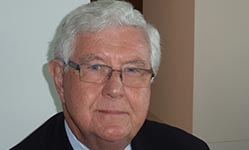Health, wellbeing of hundreds of thousands of people at stake
Author:
Publication Date: Thursday, 22 Jun 2017

The push for a Murray Darling Medical School is driven by stark realities. The health outcomes for regional communities are worse than those of their city-based cousins. This unacceptable situation is, in large part, caused by the lack of doctors for these communities.
Over the past two decades, numerous strategies have been tried to reverse the situation but none have been particularly successful. Over the past seven years, research into the causes of this problem have provided us with the evidence for the strategies that would work.
The evidence tells us we need to train medical students who live, and love living, in the country and who, on entry to Medical School, are attracted to a rural career. So we must train them in a rural university with a rural-focused curriculum that provides the skills needed for a successful rural practice.
The skills required for GPs to work successfully and happily in the country are, in many ways, different to those required by city-based GPs. This is particularly true for doctors servicing small towns.
The Murray Darling Medical School has major plans to strengthen the delivery of care in such communities; working with local government and the community to provide the professional and social support that would make being a small-town doctor more attractive.
We know that when students from the country must spend years in major cities to earn their medical degree, the majority do not return to country Australia to practice. This is understandable, indeed predictable.
Successive governments have presumed that if we trained many more doctors in established city-based universities, market forces would ensure that many would have no choice but to work in the country. Not so. In Australia's cities there are currently 440 doctors for every 100,000 people, whereas in the Murray Darling it varies from 180 to 315 doctors. This strategy has failed and we are now, if anything, producing too many doctors for the city.
This is why the Murray Darling Medical School is not asking for new medical student places to be added to the already bloated numbers. The proposed Medical School is seeking a redistribution of only 180 existing places to it annually, in a way that will be three times more efficient in producing doctors for the region.
The education of a doctor involves three distinct phases. Medical school is followed by an internship, usually in a hospital, to gain supervised experience, and then vocational training in whatever specialty is attractive to the individual. Each phase must be available in a rural setting because regional Australia will lose doctors to the city if vocational training is only available in cities.
We have now reached a stage where sophisticated medical towns such as Bendigo, Orange and Wagga can supply such training. The Murray Darling Medical School understands the importance of the package; rural medical schooling followed by a rural internship and rural vocational training.
Opposition to the project seems to come from sources that do not acknowledge the need for change nor the evidence on which the model is based.
Its creation will depend on rural communities vocally, indeed passionately, supporting initiatives that could improve the health of those living in the country. The economic benefit to the Murray Darling region from a new Medical School would also be between $1.4 billion and $2.5 billion by 2050.
Currently, La Trobe University students are working in the community, asking people to sign a petition supporting the establishment of the Murray Darling Medical School.
Here is an opportunity for online noise to make a difference. As politicians freely admit, 'it's the squeaky wheel that gets the oil' and the arguments for this are sound morally and economically.
The Murray Darling Medical School would lead to around 1900 more doctors working in the region by 2050, so we are talking about the health and wellbeing of hundreds of thousands of people.
ends
Media Note:
Professor John Dwyer, AO, PhD, FRACP, FRCPI, Doc Uni (Hon) ACU, is the Foundation Professor of Medicine and Surgery at the Murray Darling Medical School. He is also Emeritus Professor of Medicine at the University of NSW, as well as founder of the Australian Health Care Reform Alliance and President of the Friends of Science in Medicine.
For interviews with Professor Dwyer contact CSU Media.
